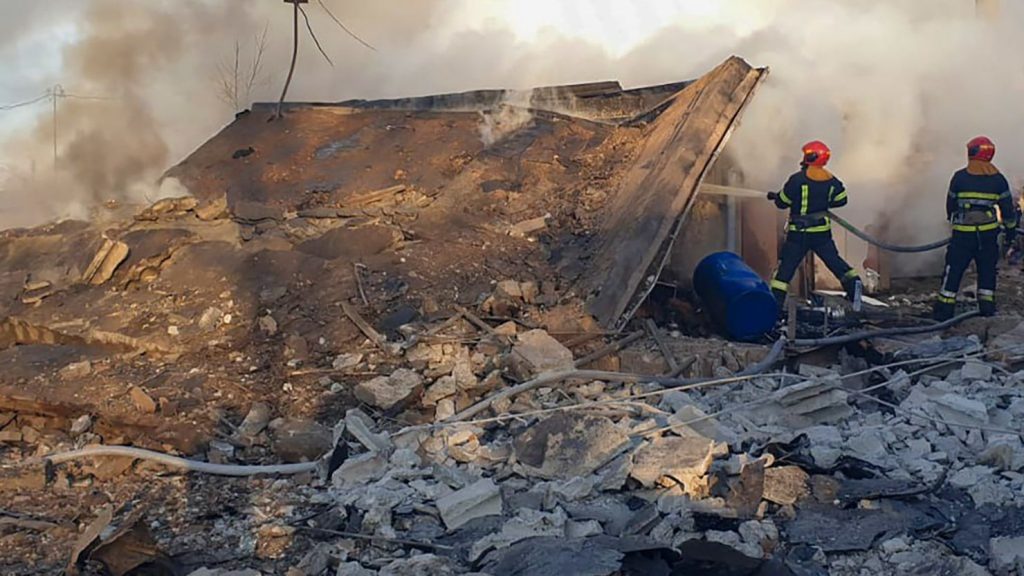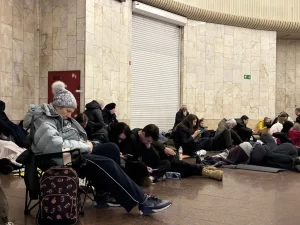‘Massive’ Russian attack causes Ukraine blackouts
4 min read
Emergency services personnel work to extinguish a fire following a Russian rocket attack in Lviv, Ukraine, on November 17. AP
A coordinated Russian missile and drone assault on Ukraine has caused widespread power outages and resulted in significant damage to energy infrastructure, President Volodymyr Zelensky announced. The attack, which targeted key power facilities in multiple cities, including Kyiv, Donetsk, Lviv, and Odesa, left at least 10 people dead and further disrupted daily life across the country.
The assault, which took place overnight on Saturday, involved the launch of approximately 120 missiles and 90 drones, making it the largest strike of its kind since early September. Ukraine’s largest private energy company, DTEK, reported “significant damage” to its thermal energy plants, resulting in widespread blackouts across the country. State-owned energy operator Ukrenergo confirmed that “restriction measures” would be implemented nationwide in response to the attack.
Zelensky described the assault as a deliberate attempt by Russia to disrupt Ukraine’s energy infrastructure, calling it an effort to “scare us with cold and lack of light.” The Russian Defense Ministry, on the other hand, claimed that the strikes were aimed at “essential energy infrastructure supporting the Ukrainian military-industrial complex,” suggesting that the attack was targeted at both military and civilian infrastructure.
The missile and drone strikes have caused widespread damage, particularly in Ukraine’s southern and eastern regions. In Odesa, Governor Oleh Kiper reported not only electricity disruptions but also a temporary loss of heat and water supplies. While water services have gradually been restored, hospitals and critical facilities in the region have had to rely on generators. Mykolaiv, located further east, also suffered from the attacks, but local officials praised the resilience of the people. “People are in good shape and want to defend themselves,” said Vitaliy Kim, the head of Mykolaiv’s regional administration.
In the capital, Kyiv, some missile fragments were intercepted and fell in various locations, but there were no immediate reports of injuries. Despite the damage, authorities remain hopeful that more survivors can be rescued in the wake of the strikes. This was the eighth major attack on Ukraine’s energy grid this year, and officials fear that it signals Russia’s continued strategy of targeting the country’s power infrastructure as winter approaches.

Ukraine has endured two harsh winters since the full-scale invasion began in February 2022. With the weather growing colder, Ukrainians are bracing for another difficult season. “Here we go again,” summed up an official from one of Ukraine’s private energy companies, reflecting the widespread anxiety that another winter without stable power looms large.
Despite the setbacks, Ukraine has managed to weather past assaults on its energy grid with ingenuity and determination. However, officials warned that Ukraine’s power generation capacity is now operating at less than half of pre-war levels. The latest strikes come as Ukraine’s neighboring countries, including Poland and Hungary, have heightened security measures. Poland scrambled fighter jets to patrol its airspace, while Hungary, which shares a border with Ukraine, was on high alert after drone attacks targeted the westernmost Subcarpathian region.
Meanwhile, both Ukraine and Russia are closely watching political developments in the United States, particularly with the incoming Trump administration. Former President Donald Trump has expressed his intent to end the war in Ukraine, a stance that has raised concerns in Kyiv about potential pressure to negotiate terms that could favor Russia’s territorial gains. The U.S. has been Ukraine’s largest arms supplier, delivering billions in military aid, and Zelensky has voiced concerns that the change in leadership could lead to less support for Ukraine.
Kremlin spokesman Dmitry Peskov recently signaled “positive” developments regarding the relationship between Russia and the U.S. under Trump, but Russia has denied reports of any direct communication between Trump and President Putin warning against escalation. Despite these concerns, the attacks on Sunday serve as a grim reminder that, for now, the war’s realities remain unchanged.
In Europe, German Chancellor Olaf Scholz defended his recent phone call with Putin, which was criticized by Kyiv as an attempt at appeasement. Scholz stated that the conversation was essential to assure Putin that Germany and its allies would not back down in their support for Ukraine. “It is now up to Putin to ensure that the war ends,” Scholz said, adding that the Russian leader had shown no signs of shifting his stance on the conflict.
As Ukraine grapples with the devastation caused by the recent attacks, the international community remains focused on ensuring continued support for Kyiv, even as the war shows no signs of abating. While Ukrainians face mounting challenges, both at home and abroad, their resolve to continue resisting Russian aggression remains steadfast.





